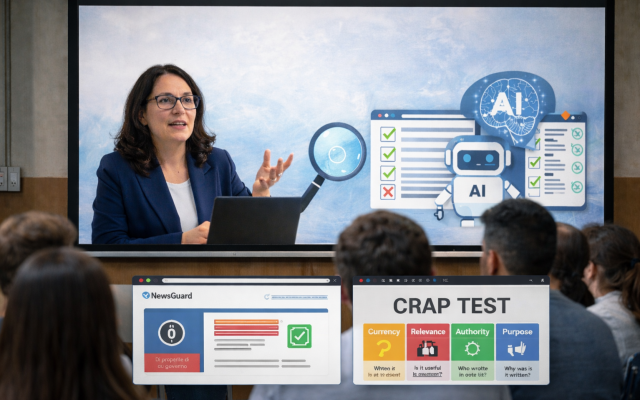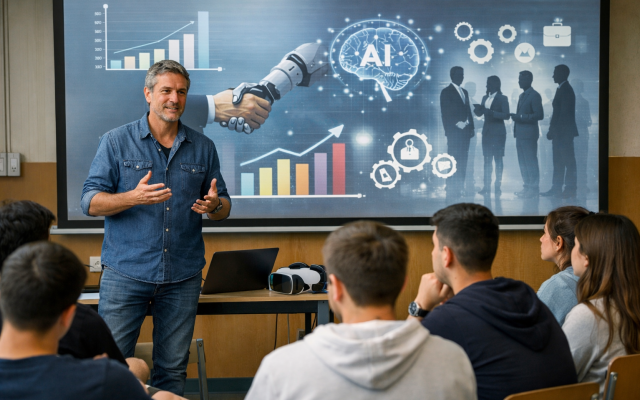“Fully Enjoy the Internet” from Nicoletta Vulpetti’s perspective
How can we evaluate the ability of an organisation to operate in complex contexts? There are over 40 models for impact assessment, but our preferred methodology is composed of stories. The story of change in real-time allows us to begin our narration from our first wins, the ones that set off short-, medium-, and long-term change. And our coaches, who act as educators, facilitators, role models, and local coordinators for our projects, are a precious source of stories.
Today, Coach Nicoletta Vulpetti explains how Project Fully Enjoy the Internet created a facilitating context in the suburbs of Rome that allowed a case of cyberbullying to emerge and allowed it to be addressed by the entire educational community, also thanks to the strategic role played by our coach …
With the Fondazione Mondo Digitale: My Experience in Suburban Schools
Rome is a very large city and it’s hard to see all of it. However, when the Fondazione Mondo Digitale proposed I travel to the farthest suburbs to hold a course on cyberbullying, I agreed. I set my navigator and drove there.
And there hasn’t been a single return journey during which I regretted this opportunity. Sure, I’ve taken some wrong turns, but that’s not a problem. It’s what these schools are all about.
So, at the end of May, I walked into this middle school on the way to L’Aquila. It was my first time there and to my surprise I found a jam-packed auditorium of parents waiting for me. Cyberbullying was obviously a real issue in this community.
Teachers usually organise meetings on digital citizenship, as they are aware it is an issue that must be introduced not only to the students, but also to their parents. And although the course was held at an inconvenient time, many parents were present.
And they participated, although I perceived an unexpressed tension, which I later identified. Just a few days earlier, an unfortunate event took place right in front of the school. Two girls had gotten into a fight. Instead of trying to separate them, their classmates had filmed the fight and then shared it on the class chat. And from there, the video rapidly spread throughout the school, humiliating and causing various issues to the two girls involved.
The father of one of the girls came to the meeting that afternoon. He was not quite sure what he could do to help his daughter. He had reported the events to the headmaster, who had called in the parents of the other involved girl. Nonetheless, after that, the father did not know what to do and was looking for help. In this type of meetings, technical competences alone are not enough. I will also confess that when I have to meet students and parents on issues such as these, I have a long talk with my psychotherapist, because it’s not just about what should and shouldn’t be posted on social media, but also how to accompany adults into an educational community that is often looked upon as students’ business. I advised the parents to explain what happened to the entire class. It was not just about a fight between two girls. It involved everyone who thought all they could do was film it. That fight could represent an opportunity for growth, not just a fact to be punished.
And then I repeated my usual mantra: You have to check up on them, know where your children are, at least until they are old enough to independently manage places and relations.
Just like it’s unthinkable to leave our ten-year-olds alone at the park, it is unreasonable to think that our children will manage the digital dimension and its potentially unlimited boundaries, alone.
The next week, I returned to the same school. This time I was going to speak with the students. Outside the school gate, a mother was waiting for me to let me know that the victim of the fight between the two girls was also there. They had convinced her to participate, but she wanted to remain invisible, she did not want to speak.
I felt the responsibility of every word that I would say – even more than usual – but I was also aware of the fact that I could do something for her. I wanted to help her find her personal power through new words that could redefine her role in that fight.
The auditorium was even fuller than during the previous meeting. It was full of middle school students, speaking and laughing, as they always do.
I began by asking them what communication meant: what do we share with others to become friends and what words make us feel bad? I then told them the sad story of Carolina Picchio, of how a “fun game” ended a life and marked that of many others for life.
What would happen if they told you? What if you were in the video shared on-line? How would you feel? Do you enjoy making others suffer? Imagine going to sleep, how would you feel about it?
The students have gradually quieted down and are now paying attention. Someone said: I would feel awful. And then various other joined in, agreeing. It was a moment of great participation, of collective empathy. The students began to understand that cyberbullying is not a game or joke, but an action that can destroy a person’s self-esteem and emotional wellbeing. I continued underlining how words could be curative and how they are powerful, more powerful than any magic wand at Hogwarts.
Roma is a very large city, and many contexts and realities often remain hidden. Travelling to the most remote schools, can make a true difference to students. So, as long as the Fondazione Mondo Digitale asks me to, I will continue making wrong turns and meeting parents, teachers, and students, because even just one word can help shed light on an opportunity that was concealed in the shadows.




